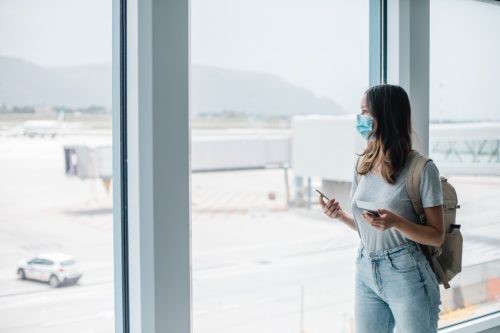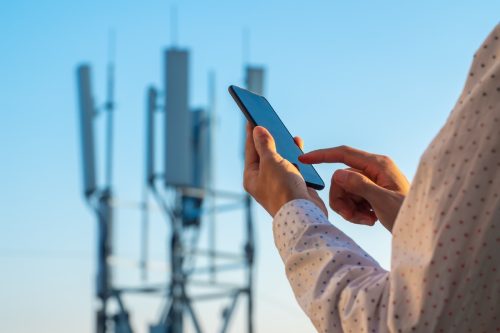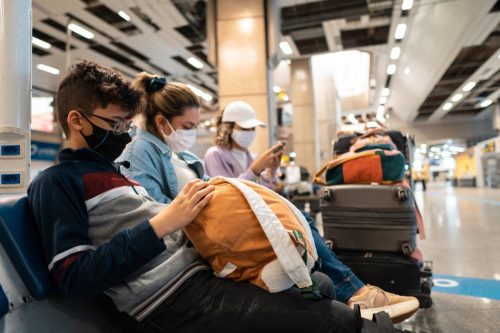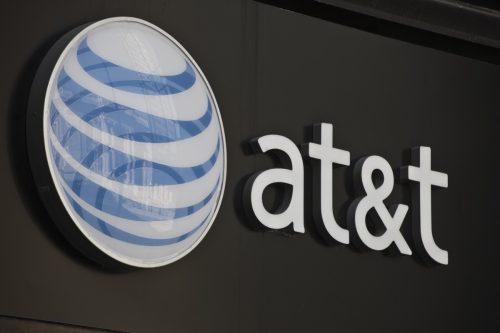This One Thing Is Being Banned at 50 U.S. Airports, Starting Jan. 19

From leaving bags unattended to carrying certain items through security, there are many things you’re forbidden from doing at the airport. But while you might think you know all there is to know about what you can and can’t do while traveling, federal regulators are always putting new policies in place that can trip up even the most experienced flyers. Now, officials are getting ready to ban one thing at 50 airports in the country, starting Jan. 19. Read on to find out what will not be allowed in just over a week.
RELATED: The CDC Just Banned You From Bringing This on Flights.
5G phone service will be banned at numerous airports soon.

Both AT&T and Verizon are planning to initiate their new 5G C-band service on Jan. 19, but it won’t be available everywhere. The Federal Aviation Administration (FAA) just released a list of 50 U.S. airports where 5G service will be banned, starting on that date, Reuters reported. According to the news outlet, these airports will have mandatory buffer zones around them to prevent the service from being used. The list of airports ranges all across the U.S., including major destinations like Newark Liberty International, Dallas-Forth Worth International, Chicago O’Hare International, and Los Angeles International.
The FAA says 5G service might disrupt a crucial tool used for some flights.

According to the FAA, this ban and these buffer zones are being implemented to “help reduce the risk of disruption” that 5G service might have on certain flights. The agency is particularly worried that the frequencies used for this new wireless service—which are in a radio spectrum called the C-band—can be too close to the frequencies used by a radar altimeter. The altimeter tool is an “important piece of safety equipment in aircraft,” the FAA says.
“Landings during periods of low visibility could be limited due to concerns that the 5G signal could interfere with the accuracy of an airplane’s radio altimeter, without other mitigations in place,” FAA spokesman Lynn Lunsford explain to The Verge.
RELATED: For more travel news delivered straight to your inbox, sign up for our daily newsletter.
The ban is set to last for at least six months.

Due to the potential risk of disruption, only airports not using 5G will be able to service low-visibility flights for at least six months to “minimize potential 5G interference with sensitive aircraft instruments used in low-visibility landings,” the FAA said. But according to the agency, this does “not necessarily” mean that flights won’t be able to land in low visibility at airports that are not among the 50 listed, according to Reuters.
Some airports—like Denver, Atlanta, and Ronald Reagan Washington National—were not included on the list because wireless carriers have not yet planned to deploy 5G service in their markets. And others are not on the list because “5G towers are far enough away that a natural buffer exists,” the FAA said.
AT&T and Verizon had initially planned to roll out 5G service in 2021.

Both AT&T and Verizon have been delaying their 5G rollout since last year, when federal aviation officials first brought up concerns. The initial deployment was planned for Dec. 5 and was then pushed back until Jan. 5 before officials asked for another two-week delay. The wireless companies originally declined the second delay request before entering a new agreement with regulators. Under this agreement, both wireless carriers will initiate their 5G service on Jan. 19, but at a lower power than they otherwise planned to and with the planned buffers around “no more than 50 priority airports,” according to The New York Times.
“If there’s the possibility of a risk to the flying public, we are obligated to pause the activity, until we can prove it is safe,” the FAA said in a Jan. 7 statement. “The FAA continues to work with the aerospace manufacturers and wireless companies to make sure 5G is safely deployed and to limit the risk of flight disruptions at all airports.”
RELATED: If You’re Offered This at the Airport, Just Say No, Experts Warn.